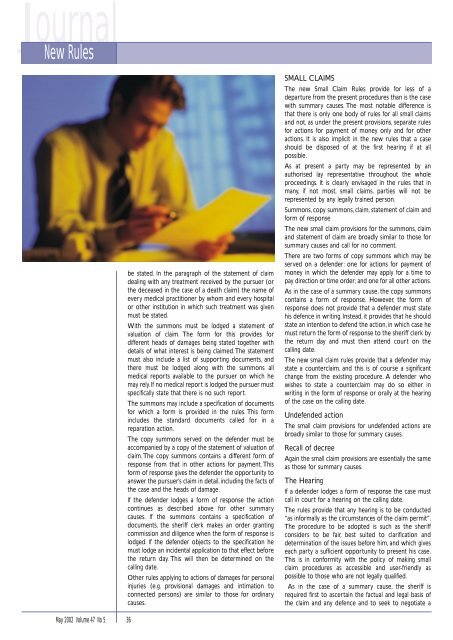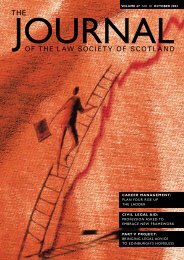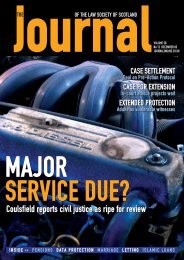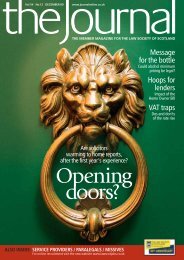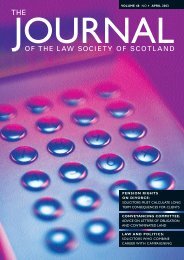OF THE LAW SOCIETY OF SCOTLAND - The Journal Online
OF THE LAW SOCIETY OF SCOTLAND - The Journal Online
OF THE LAW SOCIETY OF SCOTLAND - The Journal Online
You also want an ePaper? Increase the reach of your titles
YUMPU automatically turns print PDFs into web optimized ePapers that Google loves.
<strong>Journal</strong><br />
New Rules<br />
May 2002 Volume 47 No 5 36<br />
be stated. In the paragraph of the statement of claim<br />
dealing with any treatment received by the pursuer (or<br />
the deceased in the case of a death claim) the name of<br />
every medical practitioner by whom and every hospital<br />
or other institution in which such treatment was given<br />
must be stated.<br />
With the summons must be lodged a statement of<br />
valuation of claim. <strong>The</strong> form for this provides for<br />
different heads of damages being stated together with<br />
details of what interest is being claimed.<strong>The</strong> statement<br />
must also include a list of supporting documents, and<br />
there must be lodged along with the summons all<br />
medical reports available to the pursuer on which he<br />
may rely. If no medical report is lodged the pursuer must<br />
specifically state that there is no such report.<br />
<strong>The</strong> summons may include a specification of documents<br />
for which a form is provided in the rules. This form<br />
includes the standard documents called for in a<br />
reparation action.<br />
<strong>The</strong> copy summons served on the defender must be<br />
accompanied by a copy of the statement of valuation of<br />
claim. <strong>The</strong> copy summons contains a different form of<br />
response from that in other actions for payment. This<br />
form of response gives the defender the opportunity to<br />
answer the pursuer’s claim in detail, including the facts of<br />
the case and the heads of damage.<br />
If the defender lodges a form of response the action<br />
continues as described above for other summary<br />
causes. If the summons contains a specification of<br />
documents, the sheriff clerk makes an order granting<br />
commission and diligence when the form of response is<br />
lodged. If the defender objects to the specification he<br />
must lodge an incidental application to that effect before<br />
the return day. This will then be determined on the<br />
calling date.<br />
Other rules applying to actions of damages for personal<br />
injuries (e.g. provisional damages and intimation to<br />
connected persons) are similar to those for ordinary<br />
causes.<br />
SMALL CLAIMS<br />
<strong>The</strong> new Small Claim Rules provide for less of a<br />
departure from the present procedures than is the case<br />
with summary causes. <strong>The</strong> most notable difference is<br />
that there is only one body of rules for all small claims<br />
and not, as under the present provisions, separate rules<br />
for actions for payment of money only and for other<br />
actions. It is also implicit in the new rules that a case<br />
should be disposed of at the first hearing if at all<br />
possible.<br />
As at present a party may be represented by an<br />
authorised lay representative throughout the whole<br />
proceedings. It is clearly envisaged in the rules that in<br />
many, if not most, small claims, parties will not be<br />
represented by any legally trained person.<br />
Summons, copy summons, claim, statement of claim and<br />
form of response<br />
<strong>The</strong> new small claim provisions for the summons, claim<br />
and statement of claim are broadly similar to those for<br />
summary causes and call for no comment.<br />
<strong>The</strong>re are two forms of copy summons which may be<br />
served on a defender: one for actions for payment of<br />
money in which the defender may apply for a time to<br />
pay direction or time order; and one for all other actions.<br />
As in the case of a summary cause, the copy summons<br />
contains a form of response. However, the form of<br />
response does not provide that a defender must state<br />
his defence in writing. Instead, it provides that he should<br />
state an intention to defend the action, in which case he<br />
must return the form of response to the sheriff clerk by<br />
the return day and must then attend court on the<br />
calling date.<br />
<strong>The</strong> new small claim rules provide that a defender may<br />
state a counterclaim, and this is of course a significant<br />
change from the existing procedure. A defender who<br />
wishes to state a counterclaim may do so either in<br />
writing in the form of response or orally at the hearing<br />
of the case on the calling date.<br />
Undefended action<br />
<strong>The</strong> small claim provisions for undefended actions are<br />
broadly similar to those for summary causes.<br />
Recall of decree<br />
Again the small claim provisions are essentially the same<br />
as those for summary causes.<br />
<strong>The</strong> Hearing<br />
If a defender lodges a form of response the case must<br />
call in court for a hearing on the calling date.<br />
<strong>The</strong> rules provide that any hearing is to be conducted<br />
“as informally as the circumstances of the claim permit”.<br />
<strong>The</strong> procedure to be adopted is such as the sheriff<br />
considers to be fair, best suited to clarification and<br />
determination of the issues before him, and which gives<br />
each party a sufficient opportunity to present his case.<br />
This is in conformity with the policy of making small<br />
claim procedures as accessible and user-friendly as<br />
possible to those who are not legally qualified.<br />
As in the case of a summary cause, the sheriff is<br />
required first to ascertain the factual and legal basis of<br />
the claim and any defence and to seek to negotiate a


